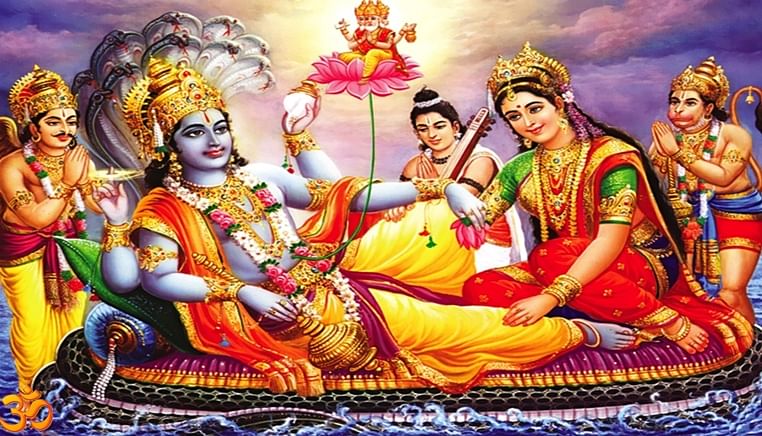No products in the cart.
आनन्दरूपे निजबोधरूपे ब्रह्मस्वरूपे श्रुतिमूर्तिरूपे ।
शशाङ्करूपे रमणीयरूपे श्रीरङ्गरूपे रमतां मनो मे ॥१॥ānandarūpe nijabodharūpe brahmasvarūpe śrutimūrtirūpe |
śaśāṅkarūpe ramaṇīyarūpe śrīraṅgarūpe ramatāṃ mano me ||1||
Meaning: (My mind delights in Sri Ranganatha’s divine form) that form (resting on the Adisesha) absorbed in bliss (Ananda Rupe) and immersed in his own self (Nija Bodha Rupe); that form embodying the essence of brahman (Brahma Svarupe) and the essence of all the shrutis (Vedas) (Shruti Murti Rupe); that form cool as the moon (Shashanka Ru (that form fills my being with bliss).
कावेरितीरे करुणाविलोले मन्दारमूले धृतचारुकेले ।
दैत्यान्तकालेऽखिललोकलीले श्रीरङ्गलीले रमतां मनो मे ॥२॥kāveritīre karuṇāvilole mandāramūle dhṛtacārukele |
daityāntakāle’khilalokalīle śrīraṅgalīle ramatāṃ mano me ||2||
Meaning: (My mind delights in the divine plays of Sri Ranganatha) those plays of him showering compassion on the banks of the river Kaveri (like its gentle waves); those plays of him assuming beautiful sportive forms at the root of the Mandara tree, those plays of his incarnations slaying demons in all the lokas (Worlds); My mind delights in the divine plays of Sri Ranga (Sri Ranganatha) (those plays fill my being with bliss).
लक्ष्मीनिवासे जगतां निवासे हृत्पद्मवासे रविबिम्बवासे ।
कृपानिवासे गुणबृन्दवासे श्रीरङ्गवासे रमतां मनो मे ॥३॥lakṣmīnivāse jagatāṃ nivāse hṛtpadmavāse ravibimbavāse |
kṛpānivāse guṇabṛndavāse śrīraṅgavāse ramatāṃ mano me ||3||
Meaning: (My mind delights in Sri Ranganatha’s various abodes) that abode of him dwelling with devi Lakshmi (in Vaikuntha), those abodes of him dwelling amidst all the beings in this world (in temples), that abode of him dwelling within the lotus of the devotees’ hearts (as divine consciousness), and that abode of him within the orb of the sun (the sun representing the divine image), that (those abodes fill my being with bliss).
ब्रह्मादिवन्द्ये जगदेकवन्द्ये मुकुन्दवन्द्ये सुरनाथवन्द्ये ।
व्यासादिवन्द्ये सनकादिवन्द्ये श्रीरङ्गवन्द्ये रमतां मनो मे ॥४॥
brahmādivandye jagadekavandye mukundavandye suranāthavandye |
vyāsādivandye sanakādivandye śrīraṅgavandye ramatāṃ mano me ||4||
Meaning: (The devotion of Sri Ranganatha thrills my thoughts) The worship offered by Lord Brahma and other (gods); The adoration offered by adherents who see him as the universe’s sole master; Sri Mukunda’s worship, as well as the worship of the head of the Suras (i.e. Indra deva), Sage Vyasa’s worship, and other (Sages’) devotion; The Kumaras’ and Sage Sanaka’s (Kumaras’) adoration; My mind is enthralled by Sri Ranga’s (Sri Ranganatha) adoration (His worship fills my being with bliss).
ब्रह्माधिराजे गरुडाधिराजे वैकुण्ठराजे सुरराजराजे ।
त्रैलोक्यराजेऽखिललोकराजे श्रीरङ्गराजे रमतां मनो मे ॥५॥brahmādhirāje garuḍādhirāje vaikuṇṭharāje surarājarāje |
trailokyarāje’khilalokarāje śrīraṅgarāje ramatāṃ mano me ||5||
Meaning: (My mind delights in Sri Ranganatha’s sovereignty) Who is the lord of Brahma, Garuda, Vaikuntha, and the king of Suras (i.e. Indra Deva), who is the lord of the three realms, who is the lord of all the worlds; My mind delights in Sri Ranga’s (Sri Ranganatha’s) rule (His lordship fills my being with bliss).
अमोघमुद्रे परिपूर्णनिद्रे श्रीयोगनिद्रे ससमुद्रनिद्रे ।
श्रितैकभद्रे जगदेकनिद्रे श्रीरङ्गभद्रे रमतां मनो मे ॥६॥amoghamudre paripūrṇanidre śrīyoganidre sasamudranidre |
śritaikabhadre jagadekanidre śrīraṅgabhadre ramatāṃ mano me ||6||
Meaning: That posture of unfailing rest (which nothing can disturb), that complete sleep (which is full of fullness), that auspicious Yoga Nidra (which is absorbed in itself in fullness), (and) that posture of sleeping over the milky ocean (and controlling everything), that posture of rest is the one source of auspiciousness (in the universe) and one great sleep which (gives rest amidst all the activities and) (that auspicious divine sleep fills my being with bliss).
सचित्रशायी भुजगेन्द्रशायी नन्दाङ्कशायी कमलाङ्कशायी ।
क्षीराब्धिशायी वटपत्रशायी श्रीरङ्गशायी रमतां मनो मे ॥७॥sacitraśāyī bhujagendraśāyī nandāṅkaśāyī kamalāṅkaśāyī |
kṣīrābdhiśāyī vaṭapatraśāyī śrīraṅgaśāyī ramatāṃ mano me ||7||
Meaning: (My mind delights in Sri Ranganatha’s auspicious resting poses) that resting pose adorned with variegated (garments and ornaments); that resting pose over the king of serpents (i.e. Adisesha); that resting pose on the lap of Nanda Gopa (and Yashoda); that resting pose on the lap of devi Lakshmi; that resting pose over the Milky Ocean; (and) that rest (those auspicious resting poses fill my being with bliss).
इदं हि रङ्गं त्यजतामिहाङ्गं पुनर्न चाङ्गं यदि चाङ्गमेति ।
पाणौ रथाङ्गं चरणेऽम्बु गाङ्गं याने विहङ्गं शयने भुजङ्गम् ॥८॥idaṃ hi raṅgaṃ tyajatāmihāṅgaṃ punarna cāṅgaṃ yadi cāṅgameti |
pāṇau rathāṅgaṃ caraṇe’mbu gāṅgaṃ yāne vihaṅgaṃ śayane bhujaṅgam ||8||
Meaning: This is Ranga (Srirangam), where if anyone sheds his body, he will not return with his body (i.e. will not be born again), if that body had approached the lord (i.e. taken refuge in the lord), (Glory to Sri Ranganatha), whose hand holds the discus, from whose lotus feet river Ganga originates, who rides on his bird vehicle (Garuda), and who sleeps on the bed (glory to Sri Ranganatha).
रङ्गनाथाष्टकम्पुण्यं प्रातरुत्थाय यः पठेत् ।
सर्वान् कामानवाप्नोति रङ्गिसायुज्यमाप्नुयात् ॥९॥raṅganāthāṣṭakampuṇyaṃ prātarutthāya yaḥ paṭhet |
sarvān kāmānavāpnoti raṅgisāyujyamāpnuyāt ||9||
Meaning: He who recites this fortunate Ranganathashtakam after rising early in the morning has all his wants realised; (and lastly) he attains Sri Ranganatha’s sayujya (absorption in the essence of Sri Ranganatha) (and gets liberated).
During his travels, Adi Sankara Bhagavatpada wrote Ranganatha Ashtakam while standing before Sri Ranganatha swamy at Srirangam. This Ashtakam says that Adi Sankara was so taken aback by Lord Ranganatha swami that his mind was immediately captured, and he relished the sensation.






